This document discusses elegant coding practices in Python, targeting intermediate programmers looking to enhance their skills with features like magic methods, iterators, decorators, and context managers. It includes examples of creating custom classes, implementing magic methods, building iterators, and using context managers for resource management. Additionally, it covers decorators and the application of function modifications to streamline coding processes.

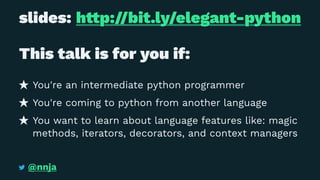




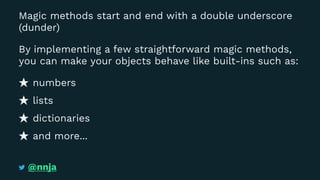
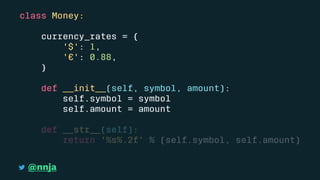
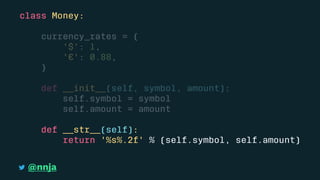
![class Money:
# defined currency_rates, __init__, and str above...
def convert(self, other):
"""Convert other amount to our currency"""
new_amount = (
other.amount / self.currency_rates[other.symbol]
* self.currency_rates[self.symbol])
return Money(self.symbol, new_amount)
@nnja](https://image.slidesharecdn.com/presentation-180511205530/85/Elegant-Solutions-for-Everyday-Python-Problems-Pycon-2018-Nina-Zakharenko-10-320.jpg)
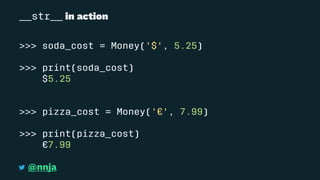
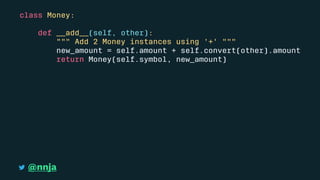
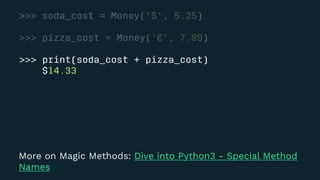
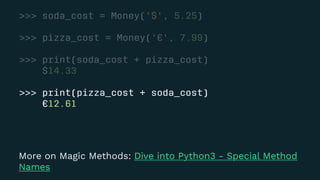
![some magic methods map to symbols
>>> d = {'one': 1, 'two': 2}
>>> d['two']
2
>>> d.__getitem__('two')
2
@nnja](https://image.slidesharecdn.com/presentation-180511205530/85/Elegant-Solutions-for-Everyday-Python-Problems-Pycon-2018-Nina-Zakharenko-15-320.jpg)
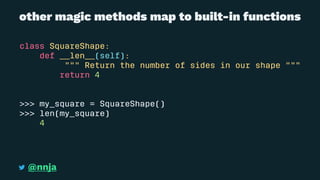

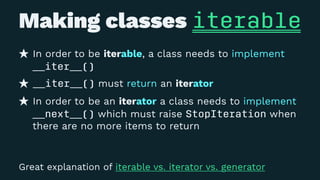

![class IterableServer:
services = [
{'active': False, 'protocol': 'ftp', 'port': 21},
{'active': True, 'protocol': 'ssh', 'port': 22},
{'active': True, 'protocol': 'http', 'port': 80},
]
@nnja](https://image.slidesharecdn.com/presentation-180511205530/85/Elegant-Solutions-for-Everyday-Python-Problems-Pycon-2018-Nina-Zakharenko-20-320.jpg)
![class IterableServer:
def __init__(self):
self.current_pos = 0
def __iter__(self):
# can return self, because __next__ implemented
return self
def __next__(self):
while self.current_pos < len(self.services):
service = self.services[self.current_pos]
self.current_pos += 1
if service['active']:
return service['protocol'], service['port']
raise StopIteration
@nnja](https://image.slidesharecdn.com/presentation-180511205530/85/Elegant-Solutions-for-Everyday-Python-Problems-Pycon-2018-Nina-Zakharenko-21-320.jpg)
![class IterableServer:
def __init__(self):
self.current_pos = 0
def __iter__(self):
# can return self, because __next__ implemented
return self
def __next__(self):
while self.current_pos < len(self.services):
service = self.services[self.current_pos]
self.current_pos += 1
if service['active']:
return service['protocol'], service['port']
raise StopIteration
@nnja](https://image.slidesharecdn.com/presentation-180511205530/85/Elegant-Solutions-for-Everyday-Python-Problems-Pycon-2018-Nina-Zakharenko-22-320.jpg)
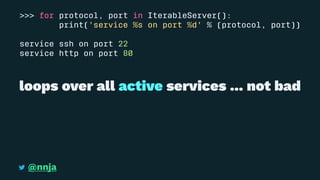

![class Server:
services = [
{'active': False, 'protocol': 'ftp', 'port': 21},
{'active': True, 'protocol': 'ssh', 'port': 22},
{'active': True, 'protocol': 'http', 'port': 21},
]
def __iter__(self):
for service in self.services:
if service['active']:
yield service['protocol'], service['port']
@nnja](https://image.slidesharecdn.com/presentation-180511205530/85/Elegant-Solutions-for-Everyday-Python-Problems-Pycon-2018-Nina-Zakharenko-25-320.jpg)
![class Server:
services = [
{'active': False, 'protocol': 'ftp', 'port': 21},
{'active': True, 'protocol': 'ssh', 'port': 22},
{'active': True, 'protocol': 'http', 'port': 21},
]
def __iter__(self):
for service in self.services:
if service['active']:
yield service['protocol'], service['port']
@nnja](https://image.slidesharecdn.com/presentation-180511205530/85/Elegant-Solutions-for-Everyday-Python-Problems-Pycon-2018-Nina-Zakharenko-26-320.jpg)
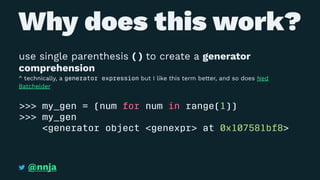
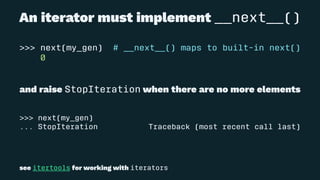

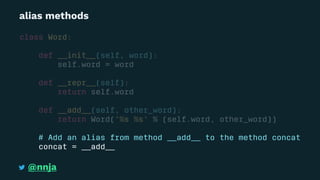
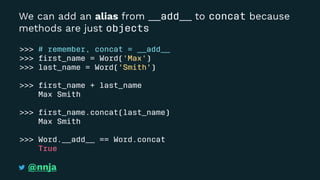
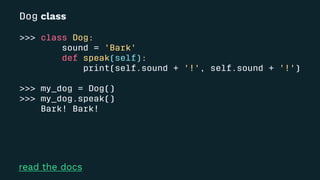
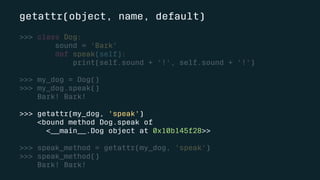
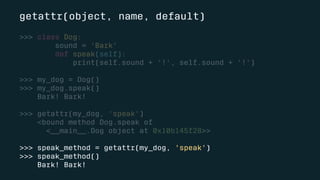
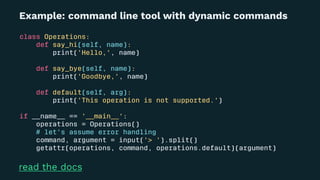
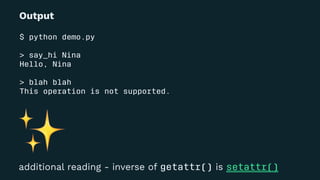
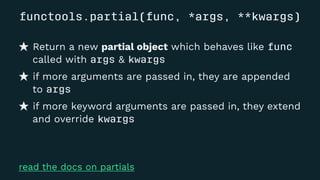
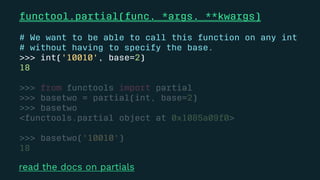
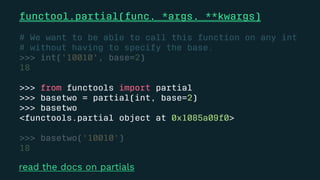
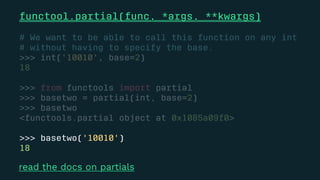

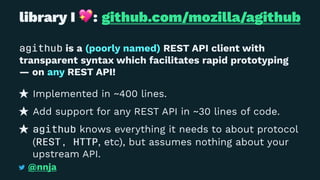
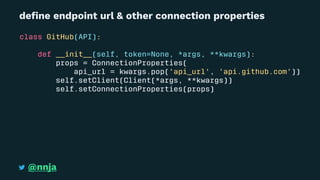
![then, start using the API!
>>> gh = GitHub('token')
>>> status, data = gh.user.repos.get()
>>> # ^ Maps to GET /user/repos
>>> data
... ['tweeter', 'snipey', '...']
github.com/mozilla/agithub](https://image.slidesharecdn.com/presentation-180511205530/85/Elegant-Solutions-for-Everyday-Python-Problems-Pycon-2018-Nina-Zakharenko-44-320.jpg)
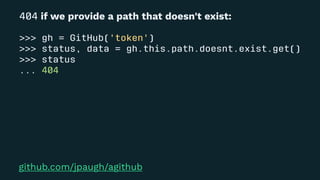

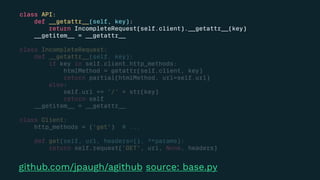
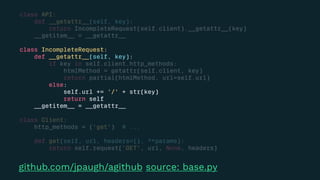
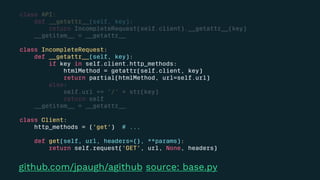



![class FeatureFlags:
SHOW_BETA = 'Show Beta version of Home Page'
flags = {
SHOW_BETA: True
}
@classmethod
def is_on(cls, name):
return cls.flags[name]
@classmethod
def toggle(cls, name, value):
cls.flags[name] = value
feature_flags = FeatureFlags()
@nnja](https://image.slidesharecdn.com/presentation-180511205530/85/Elegant-Solutions-for-Everyday-Python-Problems-Pycon-2018-Nina-Zakharenko-53-320.jpg)
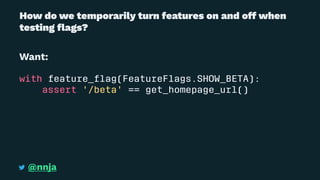
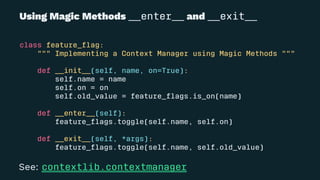
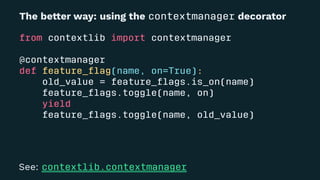
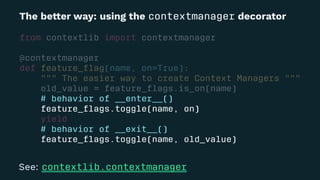
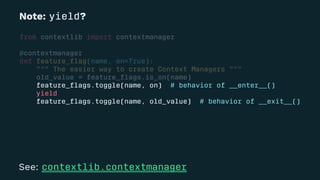




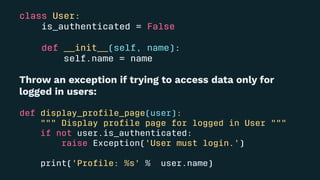
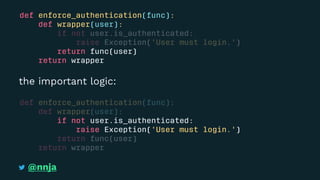
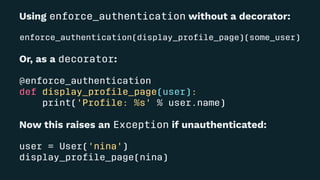
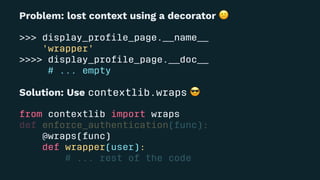


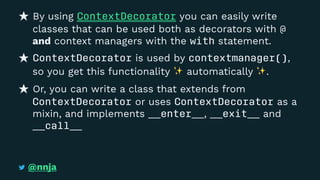
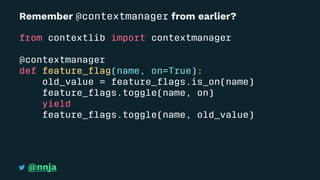
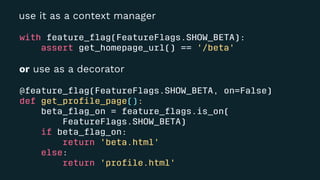
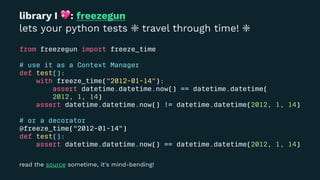

![Example
from collections import namedtuple
CacheInfo = namedtuple(
"CacheInfo", ["hits", "misses", "max_size", "curr_size"])
@nnja](https://image.slidesharecdn.com/presentation-180511205530/85/Elegant-Solutions-for-Everyday-Python-Problems-Pycon-2018-Nina-Zakharenko-74-320.jpg)
![Giving NamedTuples default values
RoutingRule = namedtuple(
'RoutingRule',
['prefix', 'queue_name', 'wait_time']
)
(1) By specifying defaults
RoutingRule.__new__.__defaults__ = (None, None, 20)
(2) or with _replace to customize a prototype instance
default_rule = RoutingRule(None, None, 20)
user_rule = default_rule._replace(
prefix='user', queue_name='user-queue')](https://image.slidesharecdn.com/presentation-180511205530/85/Elegant-Solutions-for-Everyday-Python-Problems-Pycon-2018-Nina-Zakharenko-75-320.jpg)
![NamedTuples can be subclassed and extended
class Person(namedtuple('Person', ['first_name', 'last_name'])):
""" Stores first and last name of a Person"""
def __str__(self):
return '%s %s' % (self.first_name, self.last_name)
>>> me = Person('nina', 'zakharenko')
>>> str(me)
'nina zakharenko'
>>> me
Person(first_name='nina', last_name='zakharenko')](https://image.slidesharecdn.com/presentation-180511205530/85/Elegant-Solutions-for-Everyday-Python-Problems-Pycon-2018-Nina-Zakharenko-76-320.jpg)





